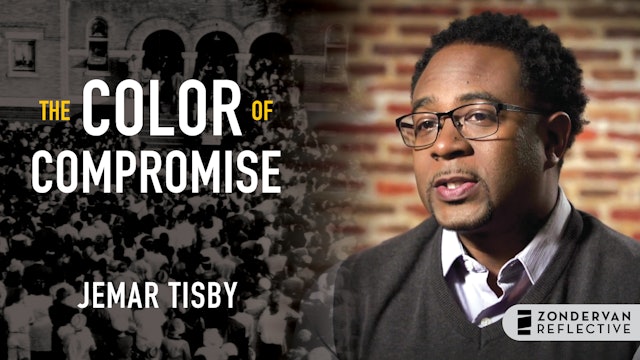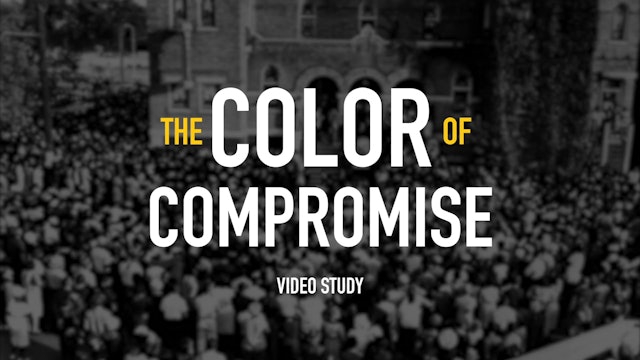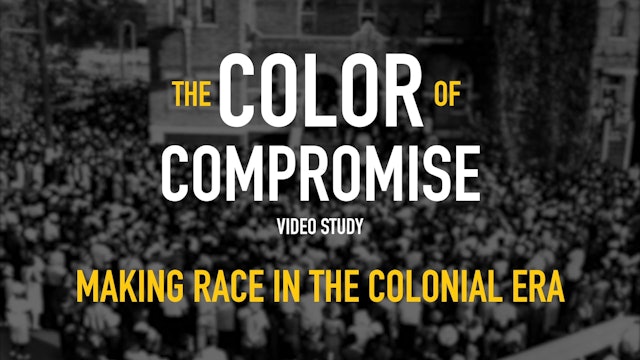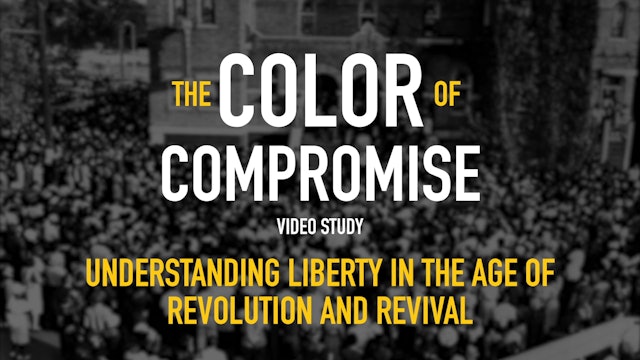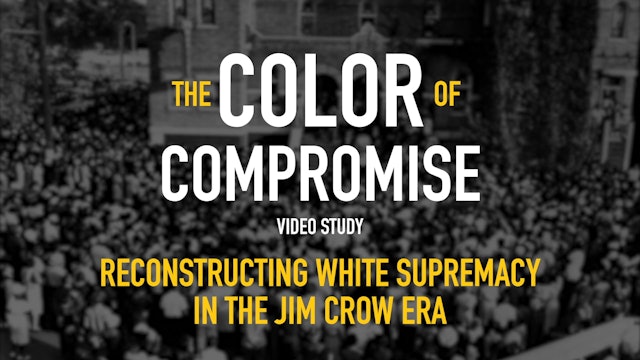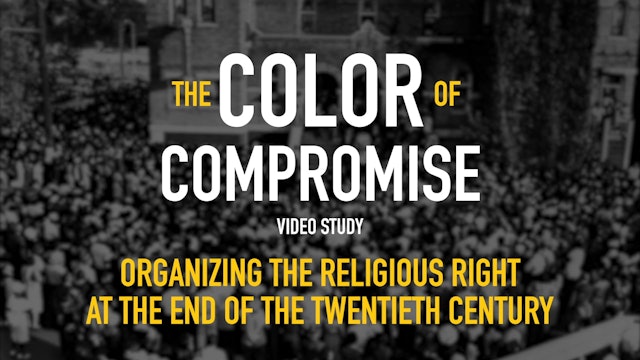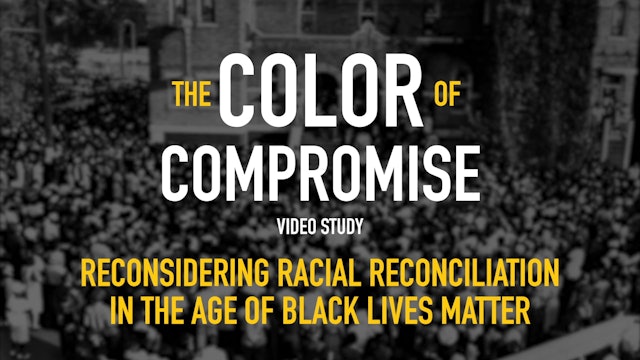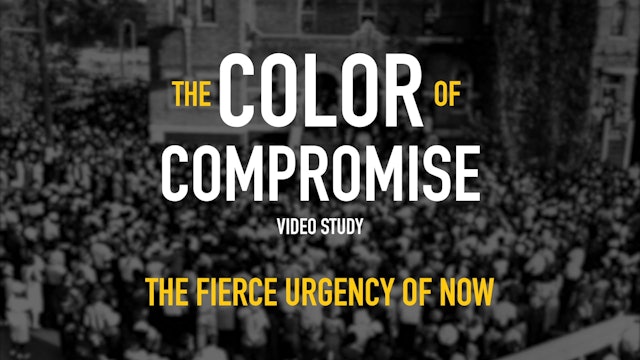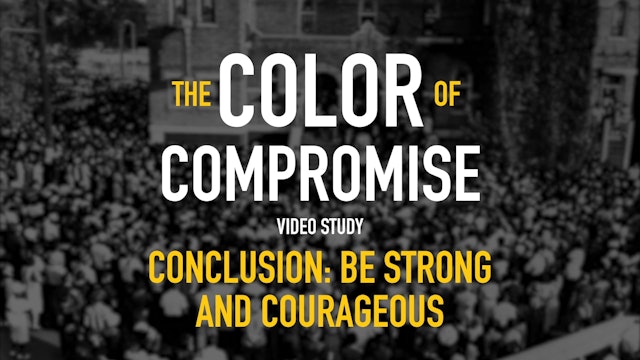Color of Compromise (Jemar Tisby)
An acclaimed, timely study of how people of faith have historically—up to the present day—worked against racial justice. And a call for urgent action by all Christians today in response. The Color of Compromise is both enlightening and compelling, telling a history we either ignore or just don't know. Equal parts painful and inspirational, it details how the American church has helped create and maintain racist ideas and practices. You will be guided in thinking through concrete solutions for improved race relations and a racially inclusive church.
Available Products:
Study Guide Book
-
The Color of Compromise - Session 1 - The Color of Compromise
A survey of the history of racism and the church shows that the story is worse than most imagine. European colonists brought with them ideas of white superiority and paternalism toward darker-skinned people. Minor repairs by the weekend-warrior racial reconcilers won’t fix a flawed foundation. Th...
-
The Color of Compromise - Session 2 - Making Race in the Colonial Era
Christianity served as a force to help construct racial categories in the colonial period. Instead of highlighting the dignity of all human beings, European missionaries told Africans that Christianity should make them more obedient and loyal to their earthly masters. But if racism can be made, i...
-
The Color of Compromise - Session 3 - Understanding Liberty in the Age of Revolution and Revival
The American church compromised with racism in the eighteenth century by permitting slavery to continue. Clergymen like George Whitefield and Jonathan Edwards typify the contradiction of American Christianity: they attempted to treat the people they enslaved humanely, yet they still acquiesced to...
-
The Color of Compromise - Session 4 - Institutionalizing Race in the Antebellum Era
The antebellum period was a time of compromise and complicity. During this time, many Christians engaged in evangelism to enslaved and freed blacks. The black church grew, laying the foundation for a distinctive tradition that would stand at the center of the black freedom struggle for the next c...
-
The Color of Compromise - Session 5 - Defending Slavery at the Onset of the Civil War
During the Civil War, pastors and theologians supported the Confederacy by providing theological ballast and biblical backing for the continuation of slavery. They prayed over the troops, penned treatises on the inferiority of black people, and divided denominations such as the Methodists, the Ba...
-
The Color of Compromise - Session 6 - Reconstructing White Supremacy in the Jim Crow Era
In the South after the Civil War, the Christian-Confederate connection was visible in public spaces and in houses of worship in their monuments, memorials, and ceremonies. The Ku Klux Klan emerged, fusing Christianity, nationalism and white supremacy into a toxic ideology of hate. Jim Crow laws, ...
-
The Color of Compromise - Session 7 - Remembering the Complicity in the North
Christians of the North have often been characterized as abolitionists, integrationists, and open-minded citizens who want all people to have a chance at equality. Christians of the South, on the other hand, have been portrayed as uniformly racist, segregationist, and antidemocratic. The truth is...
-
The Color of Compromise - Session 8 - Compromising with Racism during the Civil Rights Movement
As with other periods in America’s sordid racial history, the Christian church of the mid-twentieth century often served to reinforce racism rather than oppose it. In response to government efforts to desegregate, moderate Christians organized to oppose racial integration of neighborhoods, starte...
-
The Color of Compromise - Session 9 - Organizing the Religious Right at the End of the Twentieth Century
With the rise of the “Religious Right,” conservative Christians coalesced into a political force, and American evangelicalism became virtually synonymous with the GOP and whiteness. While neither Democrats nor Republicans adequately addressed the multitude of issues that continued to plague black...
-
The Color of Compromise - Session 10 - Reconsidering Racial Reconciliation in the Age of Black Lives Matter
Christian complicity with racism in the twenty-first century looks different than complicity with racism in the past. It looks like Christians responding to *black lives matter* with the phrase *all lives matter.* It looks like Christians consistently supporting a president whose racism has been ...
-
The Color of Compromise - Session 11 - The Fierce Urgency of Now
This session presents practical ways to address the current state of racial injustice in America, including ecclesiastical reparations, taking down confederate monuments, learning from the black church how to lament and rejoice, starting a diverse seminary, hosting freedom schools and pilgrimages...
-
The Color of Compromise - Session 12 - Be Strong and Courageous
When it comes to racism, the American church does not have a “how to” problem but a “want to” problem. The primary reason more of us do not exhibit the strength and courage required to root out racism is *fear.* The time for the American church’s complicity in racism has long passed. It is time t...

